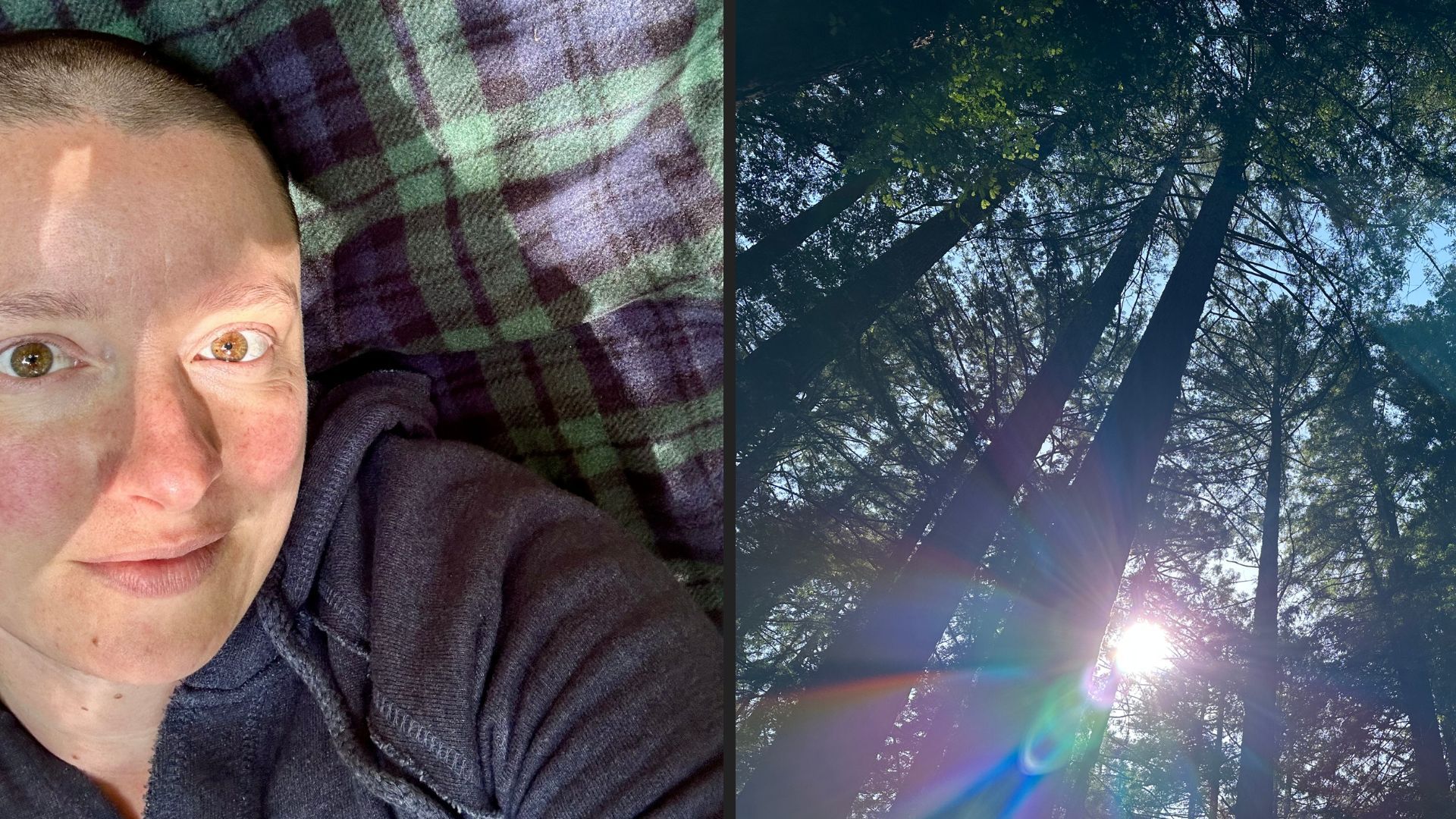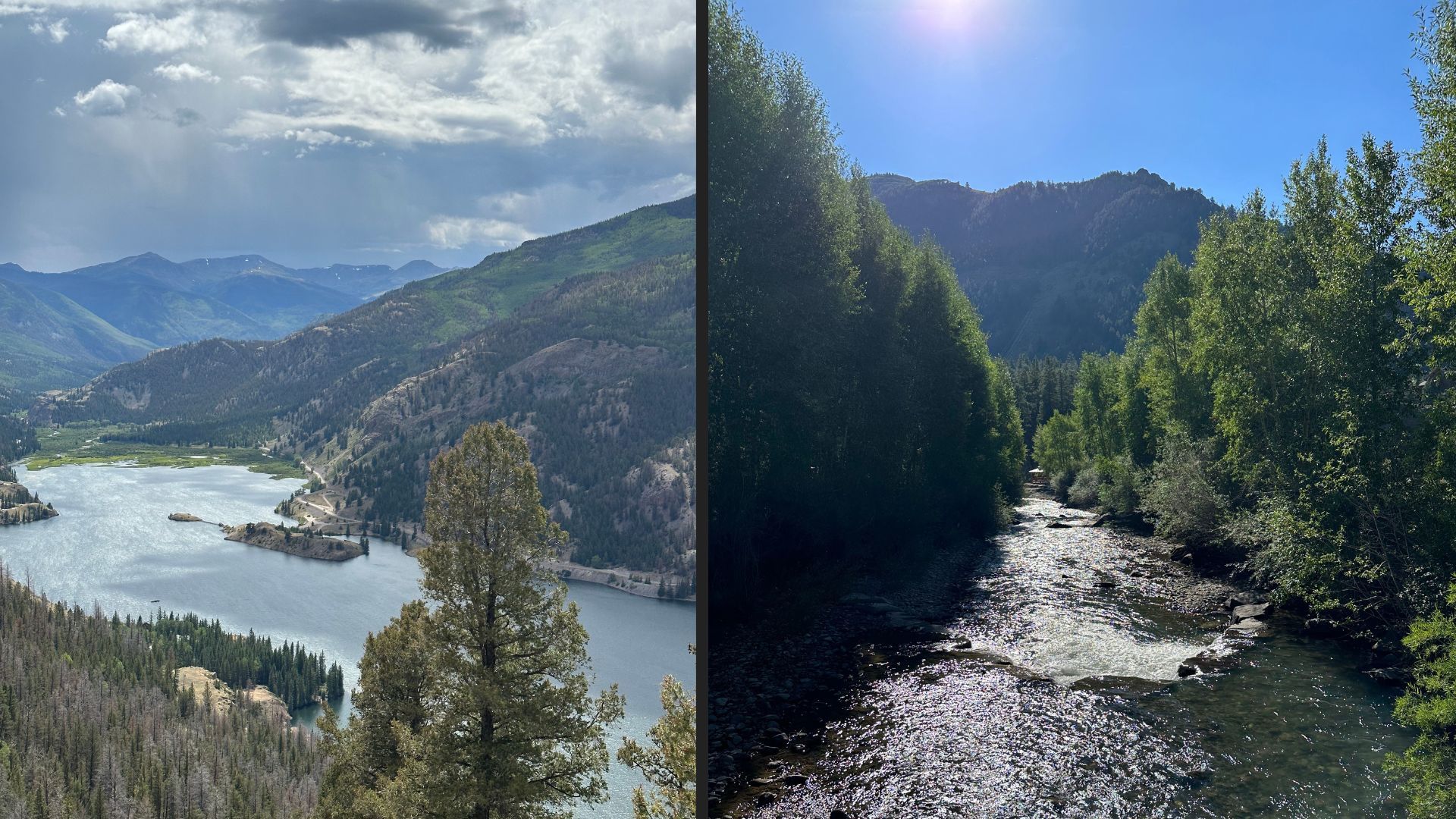Rediscovering Rest
Learning to rest at Colorado altitudes is hard. Learning to rest *at all* is harder.

Hello Shiny Humans!
What’s in this newsletter?
Today I'm going to get into my struggles with rest and my changing relationship to it. This is a really big and important topic to me.
First, a content warning: I’m going to talk about rest as someone who hasn’t worked for a year, and who (theoretically) has had unlimited access to rest during that time. Psychologically, this was scary as hell, but logistically, I had the resources and support for it to be totally okay.
In other words, my story involves some serious levels of privilege.
If that feels like a fascinating petri dish to learn from, you're in the right place. If it's likely to activate your frustration, though, this might not be the newsletter for you. (I say this because if I had heard my current perspectives at the peak of my stress a year ago, they would have irritated the hell out of me. And I don't want to add to your overwhelm.)
But before you go...
Rest is important for all of us
If you need a different entry point (or just want to explore further), here are two exceptional resources on the subject of rest, both from Black women who are leading this global conversation:
1) The Nap Ministry. Tricia Hersey, an artist and activist, is creating content on The Nap Ministry's Instagram and blog. She also has a book, Rest is Resistance, and the audiobook version is also wonderful. This is a great resource for reclaiming your right to rest, giving yourself permission for it, and honoring it as a form of resistance against systems of oppression.
2) The Seven Types of Rest. Dr. Saundra Dalton-Smith, a physician and researcher, reframes rest as restoration, and breaks it down into seven different categories: physical, mental, sensory, creative, emotional, social, and spiritual. She has a book called Sacred Rest along with a popular Ted Talk, and the basics are summarized in articles. Her framework is helpful if you’re trying to understand exactly how to rest, or want ideas for smaller actions that can make a difference in a busy schedule.
Both of these resources helped me find my entry points to rest, and I hope they can help you find yours. (And hat tip to the fabulous communication workshop facilitator, Amy Whicker, for recommending the Seven Types of Rest to me exactly when I needed it.)
The Higher-than-Mile-High Club
I spent last week in a small historical town in Colorado, at an altitude more than 3000 feet above Denver. I've done this trip before—my partner’s family has visited this town every summer since his great grandparents lived here—and it’s been difficult for me every time. I get hit with a headache, lightheadedness, weakness, and fatigue—the standard symptoms of altitude adjustment. Alcohol hits harder, too.
I’m more sensitive than others, but my experience is still within the range of normal. I’m (usually) not nauseous, confused, or breathing poorly. It’s not really medical intervention territory (...usually). It’s just... an altitude adjustment.
I have a theory that I’ve made this adjustment last longer and feel worse in the past because I was unwilling to rest. I would decide in advance on the amount of extra rest that seemed fair (which, I might add, was a very generous 8 hours of sleep, plus a willingness to work a little more casually while on vacation, and my usual commitment to drink water and not exercise), and I wasn’t interested in changing it when my body told me it needed more.
If I couldn't sleep well in the hours I had reserved for sleep, that was the altitude's fault. (Hey, I showed up to do my part, and even added wine to help!) So it was also the altitude's fault when things got worse.
"I’ll rest when I’m dead."
“Getting sick is the Western form of meditation.”
—a coworker to me, years ago
I used to feel relief when I got sick. It (usually) meant I had to rest. I wasn’t allowed to work.
(For 1-2 business days, anyway. After that, it meant that the shitty work I was pushing out between sneezing fits and brain fog shutdowns was allowed to be shitty—and was in fact admirable in its shittiness, because “other people” wouldn’t be working at all if they were in my shoes.)
(Never mind that my overworking probably caused my sickness in the first place, and that trying to work through it undoubtedly extended it.)
I believed that if I can be productive, I should be productive. This is the familiar motto of grind culture.
But I also believed that if I should be productive, I can be productive. I just have to apply enough willpower and grit.
And that's where things get twisty, and eventually break down.
To justify those breakdowns, I added another belief: If I’m pushing through something uncomfortable to be productive, it counts as being even more productive. Even if it results in a lower and crappier output. Because that suffering is virtuous.
In retrospect, this wasn’t just grind culture and a New England Protestant work ethic; it was also masking and trauma responses.
It was shutting down and overriding all signals from my body because I CANNOT afford to peek down into that endless rabbit hole of unacceptable truths it is trying to tell me. I have DEADLINES to meet. And it’s just the voice of a petulant child anyway, and there’s no way in hell I can stop long enough to listen to it and meet its needs and still be a respectable member of this society. I wear BUTTON-DOWN SHIRTS now for god’s sake.
My First Attempts at “Rest”
When I stopped last year, I stopped hard. As soon as my business was closed, I cleared everything off my calendar except therapy. I was done.
Done. Done done done. Done done do-not-fucking-talk-to-me DONE.
I had been tracking my mental health on a calendar each day as red, yellow, or green, and the months that followed were mostly red. Effectively sick days. Numb. Foggy. Staring at the ceiling. Crying. Walking gently around the block in a daze.
I found comfort in video games, and gravitated toward resource management games that simulated the grind of work stress. (If you're looking for tips, my faves are Civilization 6, Mini Metro, TD Bloons, Outlanders, My Time at Portia, and Planet Zoo.) I took them seriously, and brought the same energy that I had been bringing to my work. They felt Important, and they let me feel Important, even though I knew they were just games.
To support my recovery, I set timers to take breaks and check in with my body. I made deals with myself to not start my gaming each day until I had finished a few self-care tasks first. But pulling myself away took a lot of energy, and it alarmed me that all I wanted to do in my "rest" was play stressful games.
I joked to my partner that if my version of rest still looked like work stress, what was the difference between this and just starting a new business? At least with a new business, my stress could make money or help people.
He said, “There’s a huge difference. When you step away from a game, no one cares, so you can really put it down.” I told him I was worried I’d never put the games down. He said, “I think if you let this play out, it will probably change on its own.”
It did. After a week or two of focus on a single game, I found that I needed a break. I’d go find nature, or I'd start painting, or I'd tap into some deeper zone of therapy growth. And then I'd find a new game. Or go back to an older one. It went in cycles.
A close friend was in town for only a few days, so I rallied all of my social strength and went out for dinner. I explained how I had swapped work stress for game stress, and thought he might have some tips for balance as a gamer. His response surprised me. He said it might be really good for me if I committed to not working for an entire year.
I asked what the goal of that would be. What change would I be looking for? How would I know if I’d “arrived”?
He thought about it for a minute, then said, “You’ll still be playing Civilization. But you’ll be having fun.”
(Oof.)
An Entire Year.
I ended up taking his advice, and the year had two distinct phases: four months of searching in the dark for why I felt so broken, and then eight months of slow and careful rebuilding. (There was a clear turning point for me in between, which is a story for another time.)
In my slow rebuilding phase, my relationship to rest started to change form. It was an organic shift, and I’m not sure I could have made it happen sooner.
It got easier to just be. When my thoughts felt overloaded, I trusted that I could lie down for 20 minutes, day dream, and let my brain's background processes do their thing. Instead of forcing myself to go for a walk “to feel better,” I could bring a blanket to the woods, plop down on it, and listen to music while staring up at redwoods.

The moment when I realized something had really shifted was in a Yin Yoga class (which, first of all, I was actually willing to go to). This is the type of yoga where we spend time setting up comfortable poses with cushions for support, and then stay in those positions for several minutes each, allowing our bodies to deeply relax and melt into the floor. It felt so good that I didn't want to leave the poses when the time was up. My mind went quiet, my body was a floppy twisted pretzel, and it felt like pure bliss.
Here are some more realizations about rest that I’ve collected in this process:
- Playing a video game is less restful than I think. My body and focus are still pretty tense, and it's easy to stay locked into intensity for hours. Games are still helpful for pausing negative rumination, recovering from overwhelm, or just having fun. But as far as rest goes, gaming is more like an opening act than the main event.
- Fiction audiobooks and podcasts (which my working self had believed were a pure waste of time) are amazing resources for me. I discovered that my body can be much more relaxed (or gently active) when engrossed in audio than in a game. (It helps that I also find audio way easier to process than visual reading.)
- There’s a difference between enjoyable rest and a self-protective shutdown. The more of the former I can do by choice, the less likely I am to slip into the latter by necessity. But both are important, and shutdowns need to be respected and embraced. (For more on neurodivergent shutdowns, My Soul Balm has a great article. Shout out to my friend Benji for sending it my way when I needed it.)
- My sensory intensity can support my rest. As I’ve learned about my autism, I’ve noticed that sound and touch are the two senses I feel most reactive to. I usually think of them as my source of stress, but because they affect me so deeply, they can also bring peace and relaxation. The sounds of waterfalls and rivers are instantly soothing, and I can listen to them with noise canceling headphones anywhere. I also use compression spandex on my upper arms and weighted blankets—probably because these sensations mimic a hug, but without the unpredictability of a real human. (Although if I’m regulated enough for real humans, a good snuggle also helps.)
- Rest is most effective when it doesn't feel transactional. For a while, it was helpful to think of rest as productive — as something that will result in me being ready to contribute again. But when I get too transactional with rest, I tend to optimize it down to its “minimum dose,” and lose some of its deeper benefits. The real shift has been learning to appreciate the value of slowing down, and accessing more information from my body. I can contribute differently from a more deeply rested place than I can from a place of minimum sustainable rest.
My friend's prediction turned out to be spot-on. The more I rested, the better I could listen to my body, and one of the things it told me is that I enjoy playing shorter, easier games. (Who exactly was I trying to impress on Hard Mode?) Soon after changing the settings on Civilization, I realized, "Ohhh, this is what he meant by 'having fun'."
Testing My Skills in the Rockies
In the weeks leading up to this Colorado trip, my in-laws suggested that I ask my doctor for altitude sickness medication. I had learned so much about listening to my body this year, though, that I wanted to give it a try without a pill first.
With full support from everyone I was staying with, I spent the first two days at altitude mostly in bed. Lots of water, easy foods that feel good, and no alcohol. I felt run-down, but I expected it. I enjoyed my lighthearted Terry Pratchett audiobook, and had the (still rare for me) experience of being able to nap. When I stepped outside for a gentle walk, I found I didn’t appreciate the gorgeous mountains around me as I normally would. But I was able to recognize this was my fatigue talking, and went back to bed.
On Day 3, I woke up feeling good. Actually good. Relieved. When I stepped outside, the mountains were stunning. The sun wandered in and out between clouds and scattered showers, creating the kind of dramatic lighting that feels like a painting. I went for a walk by a river, elated.

And then I got tired again. So I rested. I felt better in two hours, and the cycle repeated. It was good enough. I could handle this. Plan for two days of rest, and then go half pace. Got it. I celebrated over dinner, excited to tell my in-laws that I had cracked the code on altitude adjustment.
And then... I woke up on Day 4 with a headache, and felt run-down for the entire day. It was sooo disappointing. I really really wanted to have a formula I could count on, but instead, I had to keep listening to my body (ugh).
So I did, and Day 5 was better. I noticed that my headache cleared in certain situations and came back in others. I was able to have a lot of fun, and then followed it with more rest.
And so it went for the rest of the trip. I didn’t find the predictable formula for altitude I was hoping for, but I did find one: Listen to your body, and rest when you need to. That’s it. That’s the formula.
(Well.. that, and keep drinking water, wear sunscreen, stretch your body if you’ve been resting in the same position all day, make sure your travel companions are expecting you to tap out regularly, and continue to be real cautious around alcohol.)
(Now that I say all that, none if this is really specific to altitude, is it? Should we just all be training for rest in Colorado, like Olympians?)
(Wait, should I start a neurodivergent burnout retreat center in Boulder?)
(Stoppit, Sarah, no new businesses! You’re still finding your footing again!)
(Okay okay okayyyyyy...)
Reframing Rest
Rest is not a punishment.
It is not a sign of failure.
It is also not a reward.
It is not decadent.
It is not selfish.
It is a critical part of how we function.
It is required for sustainability.
It is healing.
It is how we listen to our bodies.
It is how our minds reorganize.
It is how we dream.
It can be delicious.
And it can be enough.
I wish you all the rest you need and desire.
Affectionate emojis,
Sarah
Did you find something in here helpful?
If you’d like to engage with this or share your own stories, you can hit me up at hello@sarahdopp.com, or just hit “reply” to this newsletter. (Please forgive me if I'm delayed or brief with my replies. I do read everything I get; I just also have ADHD.)
To comment publicly, you can see where I’m talking about this on social media (try Instagram), and chime in there.
If you haven't subscribed yet and you'd like to receive essays like this every 1-2 weeks, you can sign up here. (Check your inbox after you do—you might need to confirm your email.)
And if you know someone who'd relate to my journey, it would mean a lot to me if you would pass this along to them. I'd love to meet them. ❤️
